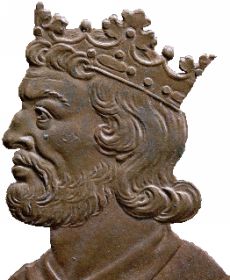I've posted a great deal about Clovis, the Merovingians, a bit about research, and historical fiction in general. What I haven't discussed is my first major female lead - and what a lead I had in Clotilde.
The queen who converted her husband to Catholicism, who bore three princes and a princess for the dynasty, who rose to the status of legend - and who became a saint of her Church - was a challenge, but such a joyous one.
I understand well, but tend to shy away from, the tendency to draw feminist characters in a historical setting. This puts no limit on the strength of personality, but also doesn't do the literary and social disservice of minimizing the extent of difficulty a woman (or any character at all) had, living in The Past. Clotilde is a fortunate resource to have in my story, because she perhaps ranks with someone like Abigail Adams in both strength of personality, personal appeal, and persuasive capability (if not in her explicit support of women's rights - heh). So the challenge with her was to present the power this woman wielded - over a king no less - in the context of a world where feminine power was hardly dominant.
Another challenge, with Clotilde, was to portray the love story between a man and a woman, without disrespect for the fact that this woman - a character I needed to render as fully flesh and blood - happens to have become a Saint of the Catholic faith. This aspect was not a major factor in my writing as I'm not an eroticist, but it was *there*, it was a thing that factored into Cloti's creation. The idea of yanking the covers off a religious icon
in flagrante delicto seems perhaps disrespectful, even if it doesn't ruffle my personal feathers to contemplate the sacred and human in one.
Clovis was a hell of a guy in this (literal - heh) respect, providing me with reasons not to get too salacious. The legend of his father, Childeric, was that dad was so handsy with his female subjects that the men of the Salian Franks booted him out of town and offered his seat to the Roman governor. This gave me a pretty obvious motivation for Clovis' later dispatch of selfsame governor's own son, but also provided compelling reason for the fact that Clovis does not come off, in history or legend, as any kind of letch. He's known to have had one son before marrying Clotilde at the not insignificant age of about twenty-seven years. Nothing is known of Theuderic's mother, but it seemed only fair to make her a concubine, if only because I am the writer and I get to indulge my fascinations - and the institute of marriage and concubinage going beyond (a) what I am personally familiar with and (b) the exoticized idea the term "concubine" tends to bring to mind for many Americans fascinates me. Also, Theuderic is known to have inherited, and the legal status of
friedlehe would certainly have conferred on any offspring the rights of any rightful heir.
So the first son gets a mom who freely chose her man, her status, and her child's future legal viability - and promptly exits, stage right. Nice to know you, mystery first love!
Clotilde comes along significantly later. Clovis has been on the throne, by the time he marries, a dozen years, not a lot less than half the span of his entire reign. I bent the legend about their union a little, but put them together at the appropriate time, and with what I hope is appropriate enthusiasm for one another. Clotilde may be a saint, but nobody ever called the mother of four a virgin - and I allow her the passion to love both her husband and her G-d. I also allow their marriage enough reality to both contain and sustain conflict.
Such as Ingomer.
Clotilde actually bore not three princes, but four. Ingomer was the firstborn between king and queen - and Ingomer also represents the major conflict between spouses pagan and Christian. Clotilde had her son baptized, much against her husband's wishes - and, when he died, Clovis blamed her Christian G-d. This may not be a Steinem-esque piece of self-actualization, but it was the palpably independent act of a woman within her time - both a figure of faith, and a strong-willed woman. As a mother, this was a core-deep matter of importance to Clotilde - and yet, taking the step was not a minor infraction.
Likewise, it makes for not a minor piece of dramatic tension, too. So bless her for being more than a little milquetoast.
Clovis' conversion, far from resulting in an immediate way from discussion with his queen, came while he was far from her - on the battlefield at
Zulpich (Tolbiac). To succumb to someone's influence when they are not directly exhorting someone speaks to both the power of the influence, and the power of the persuader. Remote success in converting someone to a way of thinking means both that the seller of an idea, and the idea, have taken up residence under the skin.
Clotilde had serious power. She had this both because her husband trusted and invested in her. Probably because he was in love with/solicitous of her. She had the charisma of a queen, as he had that of a king - a woman, like Helen, for whom such a man would do much, and a woman like Abigail, from whom a man would be willing to actually learn anything so fundamental as the matter of faith and religion.
I'll come back to Clotilde again, but had to begin some record of her. I've been a little ill, so accept my apologies if this is a weak first chapter. Still, I had to get something out.

